
[ad_1]
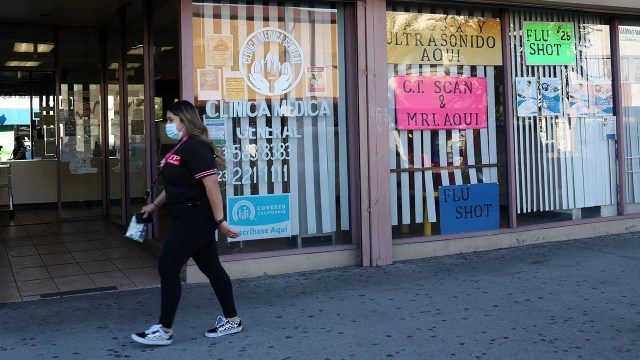
Hispanic Americans have lengthy confronted health care challenges within the United States, together with decrease medical insurance charges and fewer entry to preventative care.
Language and cultural limitations, in addition to larger ranges of poverty, are among the many social and financial components contributing to disparate well being outcomes for Hispanic Americans. These disparities have been obvious throughout the early levels of the COVID-19 pandemic, when Hispanics have been way more possible than White Americans to have died from the virus.
Pew Research Center carried out this evaluation to focus on Hispanic Americans’ attitudes about and experiences with well being care. We surveyed U.S. adults from Nov. 30 to Dec. 12, 2021, together with 3,716 Hispanic adults (inclusive of those that establish as any race). A complete of 14,497 U.S. adults accomplished the survey.
The survey was carried out on the Center’s American Trends Panel (ATP) and included an oversample of Black and Hispanic adults from the Ipsos DataPanel. Respondents on each panels are recruited by means of nationwide, random sampling of residential addresses. This manner almost all U.S. adults have an opportunity of choice. The survey is weighted to be consultant of the U.S. grownup inhabitants by gender, race, ethnicity, partisan affiliation, schooling and different classes. Read extra concerning the ATP’s methodology.
Here are the survey questions used for this analysis, together with responses, and its methodology.
This examine was knowledgeable by a bunch of advisers with experience associated to Black and Hispanic Americans’ attitudes and experiences in science, well being, STEM schooling and different areas. Pew Research Center stays solely chargeable for all facets of the analysis, together with any errors related to its merchandise and findings.
This evaluation contains further data from sources together with KFF and the U.S. Census Bureau. Further details about these sources will be discovered by means of the hyperlinks within the textual content.
Here are 5 key details about Hispanic Americans and well being care, based mostly on a 2021 Pew Research Center survey of Hispanic adults and different sources:
Hispanic adults are much less possible than different Americans to have seen a well being care supplier lately and to have a main care supplier. Seven-in-ten say they’ve seen a health care provider or different well being care supplier up to now yr, in contrast with 82% amongst Americans total. Hispanics are additionally barely much less possible than Americans total to say they’ve a main care supplier (68% vs. 76%).
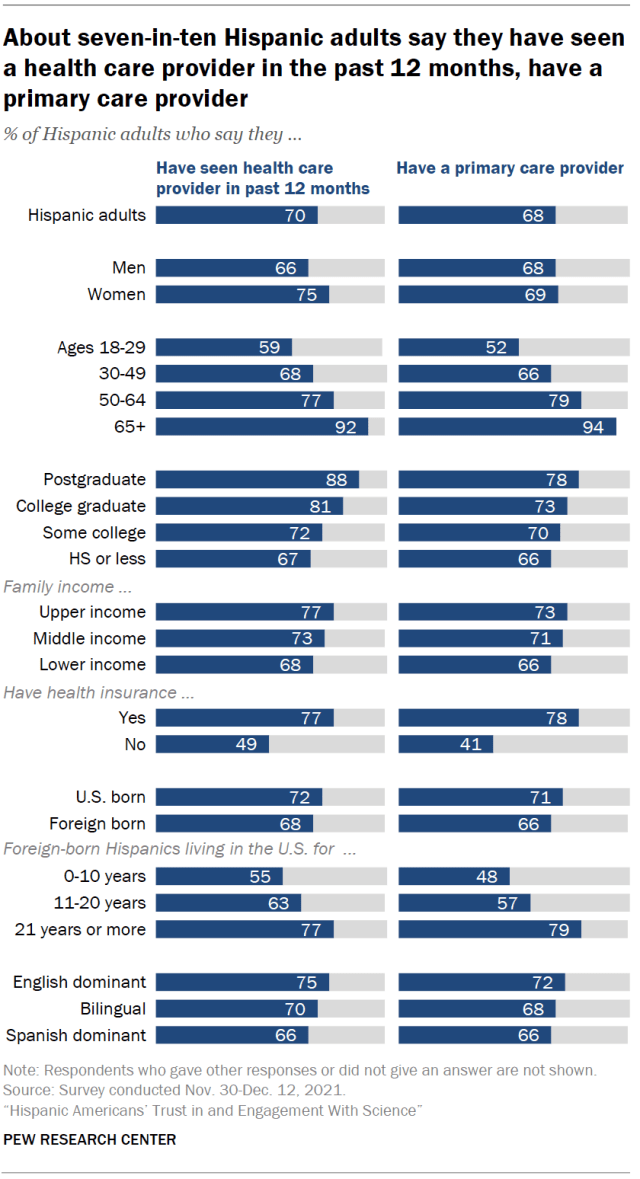
Health care entry amongst Hispanic immigrants differs markedly based mostly on how lengthy they’ve lived within the U.S. More latest arrivals are much less possible than those that have been within the nation longer to have seen a health care provider lately and to have a main care supplier. For instance, 48% of Hispanic immigrants who’ve been within the U.S. for a decade or much less report having a main care supplier, in contrast with 79% amongst those that have been within the U.S. for greater than 20 years.
Recent arrivals make up a declining share of Hispanic immigrants within the U.S. And extra broadly, immigrants account for a declining share of the overall U.S. Hispanic population. In 2021, they made up 32% of all Hispanic Americans, down from 37% in 2010.
Hispanic Americans are much less possible than individuals of different racial and ethnic backgrounds to have medical insurance. As of 2021, the uninsured fee amongst Hispanics underneath age 65 was 19%, according to KFF, formerly known as the Kaiser Family Foundation. That was larger than the share amongst Black (11%), White (7%) and Asian Americans (6%). (These figures embody charges amongst youngsters in addition to adults.)
While comparatively excessive, the uninsured fee amongst Hispanic Americans underneath age 65 in 2021 was down from 33% in 2010, earlier than the implementation of the Affordable Care Act, in response to KFF.
Lower charges of medical insurance protection play a significant function in Hispanic Americans’ much less frequent interactions with well being care suppliers.
The relative youth of the U.S. Hispanic inhabitants could also be one other issue at play. The median age of Hispanic Americans was 30 as of 2020, in contrast with 41 for non-Hispanic Americans, according to the U.S. Census Bureau. Among each Hispanic and non-Hispanic Americans, youthful persons are much less possible than their elders to have seen a well being care supplier lately and to have a main care supplier.
Many Hispanic Americans say worse well being outcomes for Hispanics are tied to occupational and structural components. Some 53% of Hispanic adults say a significant purpose why Hispanic individuals typically have worse well being outcomes is that they’re extra prone to work in jobs that put them in danger for well being issues. About half (48%) say a significant purpose is that Hispanic individuals have much less entry to high quality medical care the place they dwell.
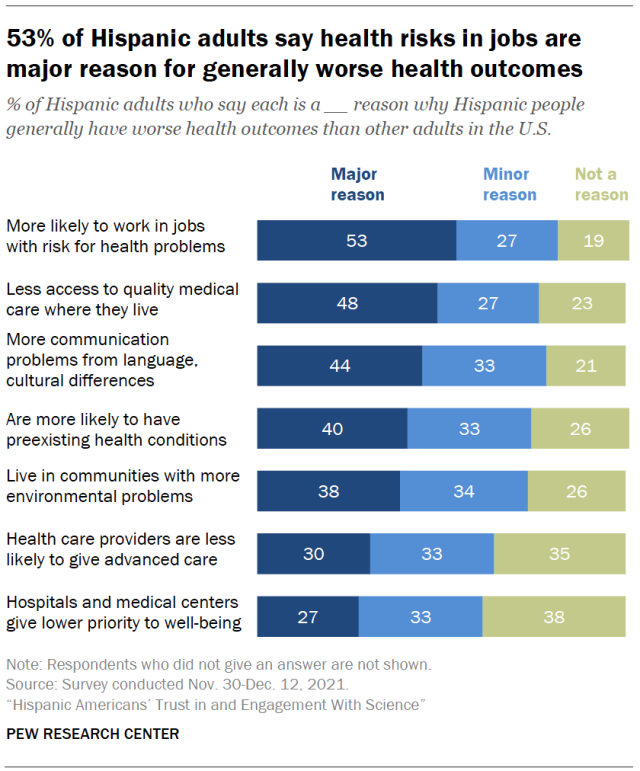
At least four-in-ten Hispanic adults additionally level to communication issues arising from language or cultural variations (44%) and preexisting well being circumstances (40%) as main causes. (Majorities view all of those components as not less than minor causes for disparate well being outcomes amongst Hispanic adults.)
The coronavirus outbreak took an especially heavy toll on Hispanic Americans in comparison with White Americans. Hispanics additionally face higher rates of certain diseases like diabetes than another Americans.
When it involves progress in well being outcomes for Hispanic individuals, 51% of Hispanic adults say well being outcomes have gotten so much or somewhat higher over the previous 20 years, in contrast with 13% who say they’ve gotten so much or somewhat worse; 34% say they’ve stayed about the identical.
About a 3rd of Hispanic Americans – together with 58% of Hispanic immigrants – say they like to see a Spanish-speaking well being care supplier. Overall, 35% of Hispanic adults strongly or considerably favor seeing a Spanish-speaking physician or different well being care supplier for routine care. A bigger share (51%) say it makes no distinction whether or not the physician they see speaks Spanish or not. And 13% say they’d fairly not see a Spanish-speaking physician.
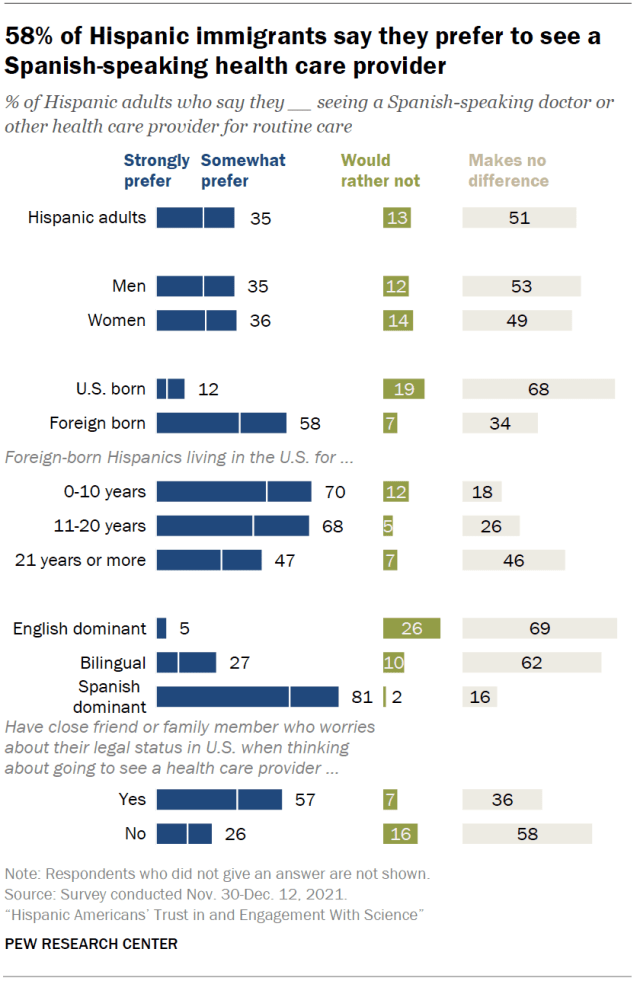
Attitudes are broadly related in the case of seeing a Hispanic physician or well being care supplier. A 3rd of Hispanic adults say they would like to see a Hispanic physician for routine care, whereas 59% say it makes no distinction and seven% would fairly not.
Among Hispanic adults, immigrants are more likely than these born within the U.S. to favor seeing a Spanish-speaking physician (58% vs. 12%) and to favor seeing a Hispanic physician (47% vs. 20%). About half of Hispanic immigrants within the U.S. principally communicate and browse in Spanish.
Hispanic Americans account for 19% of the U.S. population. But solely 9% of the nation’s well being care practitioners and technicians are Hispanic, in response to a 2021 Pew Research Center analysis of federal government data. And simply 7% of all U.S. physicians and surgeons and seven% of registered nurses are Hispanic.
Black Hispanic adults usually tend to report detrimental well being care experiences than different Hispanic adults. Overall, about half of Hispanic adults (52%) say they’ve had not less than one in all six detrimental well being care experiences requested about within the Center’s 2021 survey, together with feeling rushed or having to talk as much as get the correct care. This is just like the share of all U.S. adults who report having not less than one in all most of these detrimental experiences.
However, there are notable variations amongst Hispanics by race. Hispanic Americans who establish as Black are more likely than White Hispanic adults to have confronted detrimental well being care experiences. For occasion, 52% of Black Hispanic adults say they’ve needed to communicate as much as get correct care, in contrast with 31% of White Hispanic adults. And Black Hispanic adults are 15 proportion factors extra possible than White Hispanic adults to say they’ve obtained lower-quality care (37% vs. 22%).
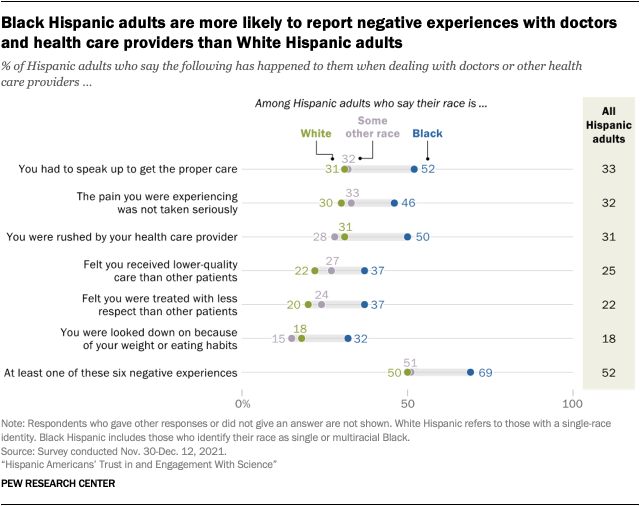
While detrimental well being care experiences are pretty widespread, most Hispanic adults have typically constructive opinions about their newest well being care interplay. A 56% majority say the standard of care they most lately obtained from docs or different well being care suppliers was glorious or superb, whereas one other 28% say it was good. Fewer (14%) say the care they obtained was solely honest or poor. Black and White Hispanic adults are about equally possible to present constructive scores of their most up-to-date well being care expertise.
Note: Here are the survey questions used for this analysis, together with responses, and its methodology.


[adinserter block=”4″]
[ad_2]
Source link